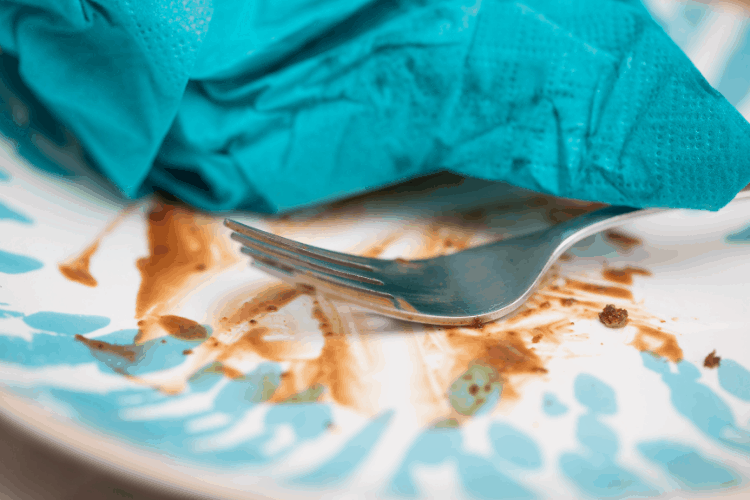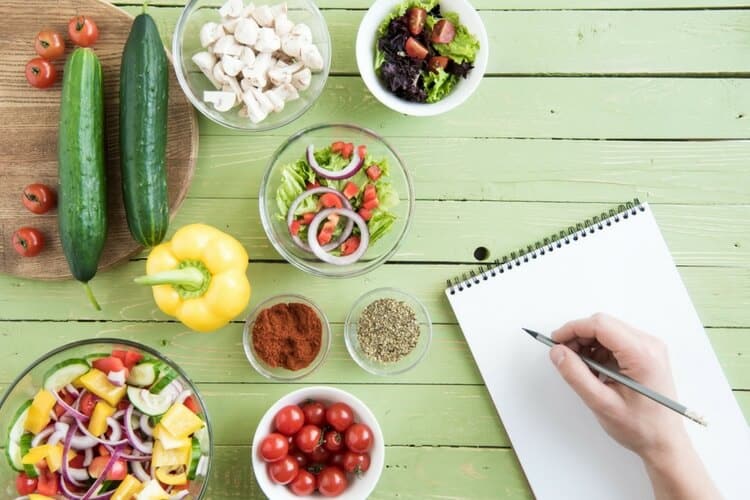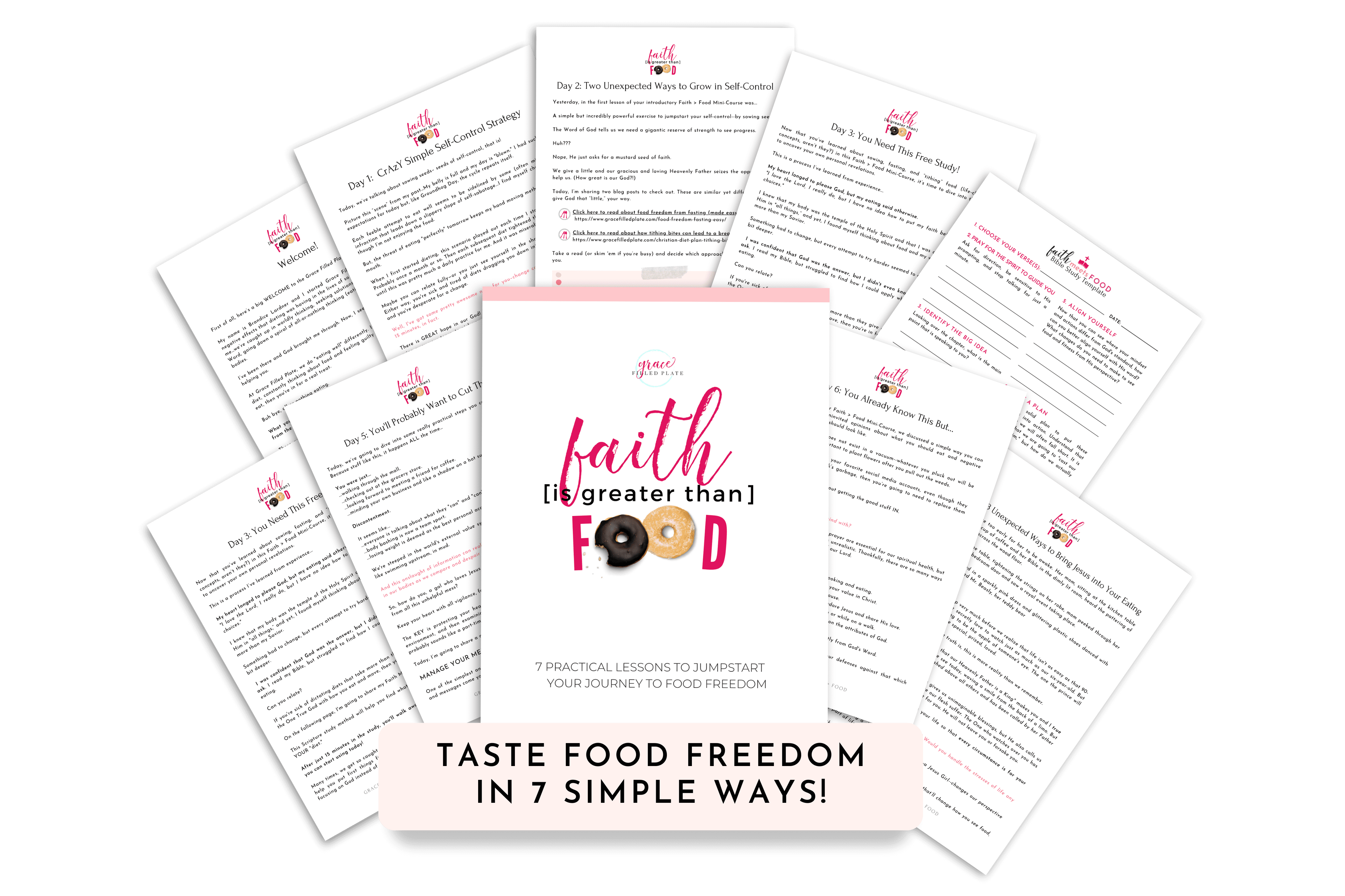Do you wonder, “Am I eating too much?” This post will help you sort through all the conflicting diet information so you can find your next best steps!
I sat in the super-cushy red-padded booth and surveyed the plates of the women around me. I’d ordered my signature grilled chicken and salad and was pushing around the last few bites of lettuce on my plate.

I felt like I should leave some behind. After all, I am the nutrition coach who talks about stopping when satisfied.
It seems as though they’d all decided dinner was done and doggy bags were requested.
But me– I was still hungry.
I wrapped up my evening with friends and made a beeline to the refrigerator when I got home. I ate a few bites of leftovers and then created my favorite concoction of yogurt and frozen blueberries.
“Am I eating too much?” I wondered. But, I knew my answer.
Maybe you can relate. Maybe you find yourself chasing a seemingly endless appetite that leaves you longing for a sigh of satisfied relief.
No matter what leads you to eat more than you think you should, there’s a “why.” In this post, I’ll help you decipher your motives to keep chewing so that you can come up with a formidable solution
To eat or not to eat. That is the question we’ll answer today.
What Makes You Think You’re Eating Too Much?
Your assessment of your food intake holds valuable insight. Whether your assessment is based on truth or speculation, there is much to be learned.
Here we’ll dig into your “why” so that you can then determine your truth.
1. You’re Comparing How Much You Eat To Others
It is human nature to get stuck in the comparison trap and comparison is the thief of joy. God has created us each with an internal desire to measure up. The purpose of that compass is to shine a light on our need for Christ.
However, most of us look around horizontally for our measuring stick.
From our body’s shape and size, to how organized we are, to how well behaved our kids are after they’ve missed a nap and meals, we’re never short on affirmations that we may not be “good enough.”
If you are looking at your food intake through the lens of what others do and say (and say they do), then it’s quite possible that you’re making judgments based on lies or someone else’s truth.
Celebrities and bloggers share “What I Ate Wednesday” displaying their picture-perfect eating day. They recite and capture meals that represent their best eating day possible.
There’s no lie detector test that validates their entries and no photo of them grabbing that extra scoop of almond butter as they prepared their plates (because who doesn’t do that?).
2. You Feel Too Full
Dinner ends and then it happens. What felt like a reasonable amount of food has settled in and now you’re ready to burst at the seams.
Probably the most obvious clue that you’re eating too much is how you feel after you eat. If your belly has expanded to new horizons then chances are good that your portion was too much for your size.
But there is one time that this isn’t quite the case. There are times you may be eating too much and eating too little at the exact same time.
Enter Diet Math.
I was a professional dieter. Give me a food plan, a calorie count, or a “don’t eat food list” as long as War and Peace and I can give you a workaround for every variable.
And, when it comes to volume, I am a master. I create mounds of food for fewer calories like a Christmas inflatable that comes in a vacuum sealed box.
And, I know how to be stuffed to the gills and completely unsatisfied at the same time.
If you feel too full after eating, it’s a great indicator that something is off.
3. You’re Not Losing Weight
If your weight loss efforts are anything but rewarding, then you may be eating too much. You can even eat healthy food in excess, making losing weight difficult.
We all have ideas about how much we think we should and would like to eat and, unfortunately, that amount does not often coincide with what our body needs.
If your weight is stuck or increasing, notice if you’re feeling hungry on a regular basis. Not feeling hungry means that your body has not been given enough time to metabolize your latest meal.
However, in some cases, years of chronic dieting can impact your ability to lose weight, so be sure to consult your doctor if you feel stuck, stuck, stuck.
Or, you may be trying to lose those last 10 “vanity pounds” that aren’t in line with your best health.

“Am I Eating Too Much?” Answered
You’re starting your latest diet and you eagerly flip the calorie chart. You find your height and then skim across the diagram to find your weight. The number feels liberating and suffocating at the same time. You don’t know how much you should eat so there is relief in finding a guide, but that guide feels more like a nutritional straightjacket.
Diets teach us that we are not to be trusted. That we must eat a specified amount and type of food and be a certain size to be healthy.
But that graph is putting you in a box based on averages and assumptions. How does your body metabolize food?
What is your activity level, hormonal status, muscle mass?
How do those plans reflect your available time, effort, resources, and preferences?
The one to answer the question “Am I eating too much?” is YOU.
I know, you’re rolling your eyes– surely I don’t know your story and struggles.
But, let me encourage you that one reason you may feel stalled is that you are outsourcing your decision making when it comes to how you eat and move.
Diets condemn. But God’s grace overflows even into our diets. If you’re unsure if you are eating too much, pray for the Holy Spirit to convict and direct you. His voice is a whisper and His hope is great.
How to Reconnect With Your Body
The first step to answering the question “Am I eating too much?” for yourself is found in awareness, observation, and alignment.
1. Exercise Awareness
Note different sensations you feel. Try eating a wee bit less and putting off a meal 15 minutes and see how it feels.
2. Observe With Grace
Notice what is going on in your body. There is no “right” or “wrong,” “good” or “bad.” It just is.
Then, ask yourself the following questions:
What portions feel best to me?
How do different types of food affect fullness?
What level of fullness feels best to me?
Make a mental note and leave it at that.
3. Gently Realign
Taking the information you have gathered, in what ways could you better connect with your body so that you don’t feel like you’re eating too much?
Here are a few suggestions for you to play around with. Please note, this is not a to-do list, it’s an inspiring list.
Skim these ideas and see if any feel like a good fit for you. Then, pick ONE and focus on implementing it over the next week or two.
Cut your meal in 1/4s (with your imagination, if you feel more comfortable). Then, commit to stopping after each 1/4 to check in and see how you feel. Try to stop when you’re satisfied rather than full.
Chose a new number to aim for on the Hunger and Fullness Tracker. If dropping a whole point feels like too much to you, feel free to aim for a .5.
Connect to your fullness by learning how to eat more slowly.
If you still feel completely disconnected from what your body needs, aim to eat 10% less at meals and see how it feels. Observe and realign, as you feel comfortable.
You may also want to read more about how to stop eating when full and satisfied.
When You Eat Too Much
There you have it— the clear but not always so clear answer to “Am I eating too much?” I have worked with hundreds of women and have to say that stopping when satisfied is one of the most challenging habits.
Meaning, you probably won’t nail this new practice right away and that’s ok and expected.
Rather than beating yourself up and turning this into just another diet, and diving head-first into all-or-nothing eating, continue to observe with grace and gently realign as you learn.
When you slip and fall into a double fudge sundae and end up eating too much, hit the reset button then and there and commit to honoring your body’s needs for the rest of the day.
That is the most and best that you can do.
In Conclusion
We can’t compare ourselves to others. Our journey is our own.
I didn’t satisfy my hunger with that salad and chicken that day, and then I ate to compensate– and that’s ok. I now know that when I’m really hungry, I just order more when out to eat.
It doesn’t matter what anyone else is doing. You and only you have the authority to say what’s right and what’s not.
Own that knowledge and reconnect with what your body is telling you.
Brandice Lardner is a Certified Personal Trainer, Nutrition Coach, Amazon #1 Best Selling Author, Homeschool Mom, and Jesus Girl whose mission in life is to help women ditch the diet mentality and find peace with food and their bodies so that they are better equipped to do the great things God has called them to do.





Thank you for this post, have been trying to listen to my body as God has told me to do. Downloaded the tracker and will try your suggestions. Eating healthy but sometimes not satisfied but feel I shouldn’t eat more because of the calories the calculator says I should eat each day. I Try to not go over 100 or eat my exercise calories burned
Hey Tyra! I am glad you found this helpful! While counting calories can be a great tool to give us a general idea about how much we’re eating, there are so many intricacies that it a difficult practice to rely on. Keeping track of your hunger and fullness may reveal something interesting 🙂 This post can help too: http://gracefilledplate.com/should-i-count-calories/